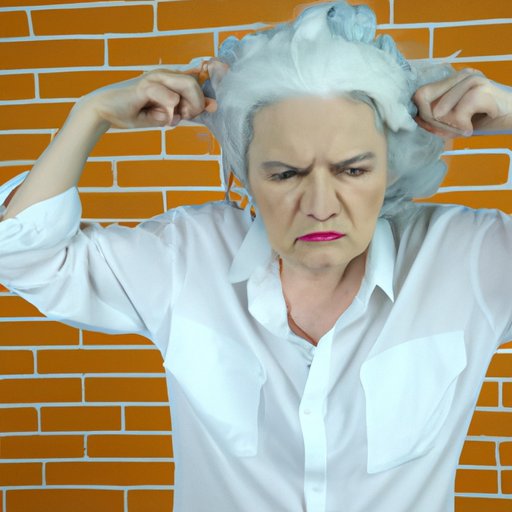Introduction
Grey hair is a natural part of the aging process, but it can also be a cause for concern and insecurity for many people. While some people choose to embrace their grey hair, others opt to dye it in order to maintain a more youthful appearance. In this article, we will explore the science behind hair turning grey, debunk common myths about greying hair, discuss the impact of stress, diet, and lifestyle, and provide tips on how to care and cope with grey hair.
The Science Behind Greying Hair
Our hair color is determined by melanin, a pigment produced by specialized cells called melanocytes. As we age, the production of melanin decreases, causing our hair to lose its color and turn grey or white. Additionally, genetics play a significant role in determining the age at which our hair turns grey and the shade of grey that it becomes. People of different ethnicities may also experience differences in the rate and pattern of greying hair.
Debunking Common Myths About Grey Hair
Despite the prevalence of grey hair, there are still several myths and misconceptions surrounding it. One common misbelief is that plucking out grey hair will cause more grey hair to grow in its place. In reality, plucking hair has no effect on the production of melanin. Similarly, stress is often blamed for causing grey hair, but there is no conclusive evidence that suggests a direct link between the two. Furthermore, hair dye does not cause hair to turn grey, but rather covers up existing grey hairs.
The Impact of Stress on Hair Color
While stress may not directly cause hair to turn grey, it can accelerate the greying process. When we experience stress, the body produces cortisol, a hormone that can damage the melanocytes responsible for producing melanin. Chronic stress can lead to accelerated greying of hair, particularly in people who are genetically predisposed to premature greying. Fortunately, managing stress through practices like meditation, yoga, and exercise can help slow down or even prevent premature grey hair.
How Diet and Lifestyle Affect Hair Color
Our diet and lifestyle can also play a significant role in the health and color of our hair. Nutrient deficiencies, such as low levels of vitamin B12, iron, and zinc, may contribute to premature greying of hair. Similarly, smoking and a sedentary lifestyle can also negatively affect hair color. A balanced diet, regular exercise, and avoiding harmful habits like smoking can help maintain the vibrancy of your hair.
Cultural Attitudes Towards Gray Hair
The way we view grey hair is heavily influenced by cultural norms and societal expectations. In some cultures, grey hair is seen as a sign of wisdom and maturity, while in others it may be stigmatized as a sign of old age. Understanding and embracing cultural attitudes towards grey hair can help us feel more empowered and confident about our own aging process.
Coping Strategies for Grey Hair
If you are experiencing grey hair, there are several tips and tricks that can help you care and cope with it. Using products specifically formulated for grey hair can help keep it looking healthy and vibrant. Additionally, embracing your natural beauty and owning your grey hair can be a liberating and empowering experience.
Conclusion
In conclusion, hair turning grey is a natural process that should be embraced rather than feared. Understanding the science behind it, debunking common myths, and taking care of your body and mind through healthy diet and stress management can help slow down and prevent premature greying. Ultimately, it is important to embrace and celebrate our unique, ever-evolving selves, and grey hair is no exception.
